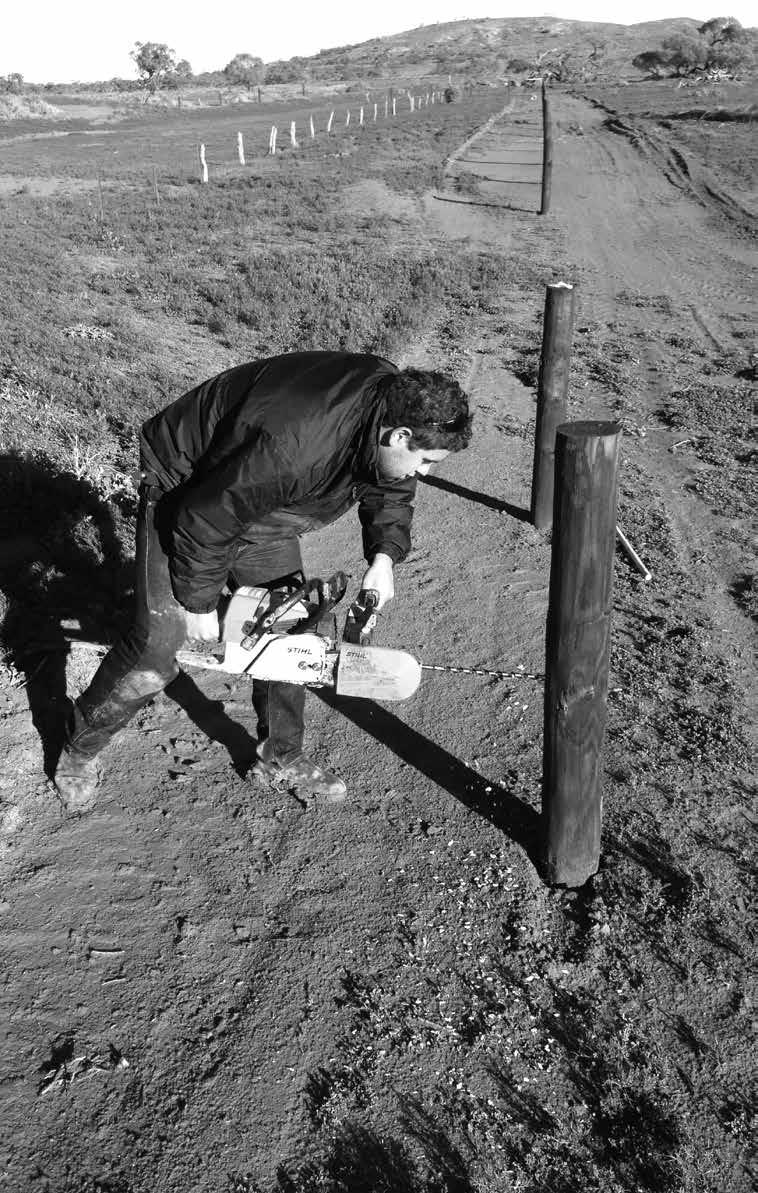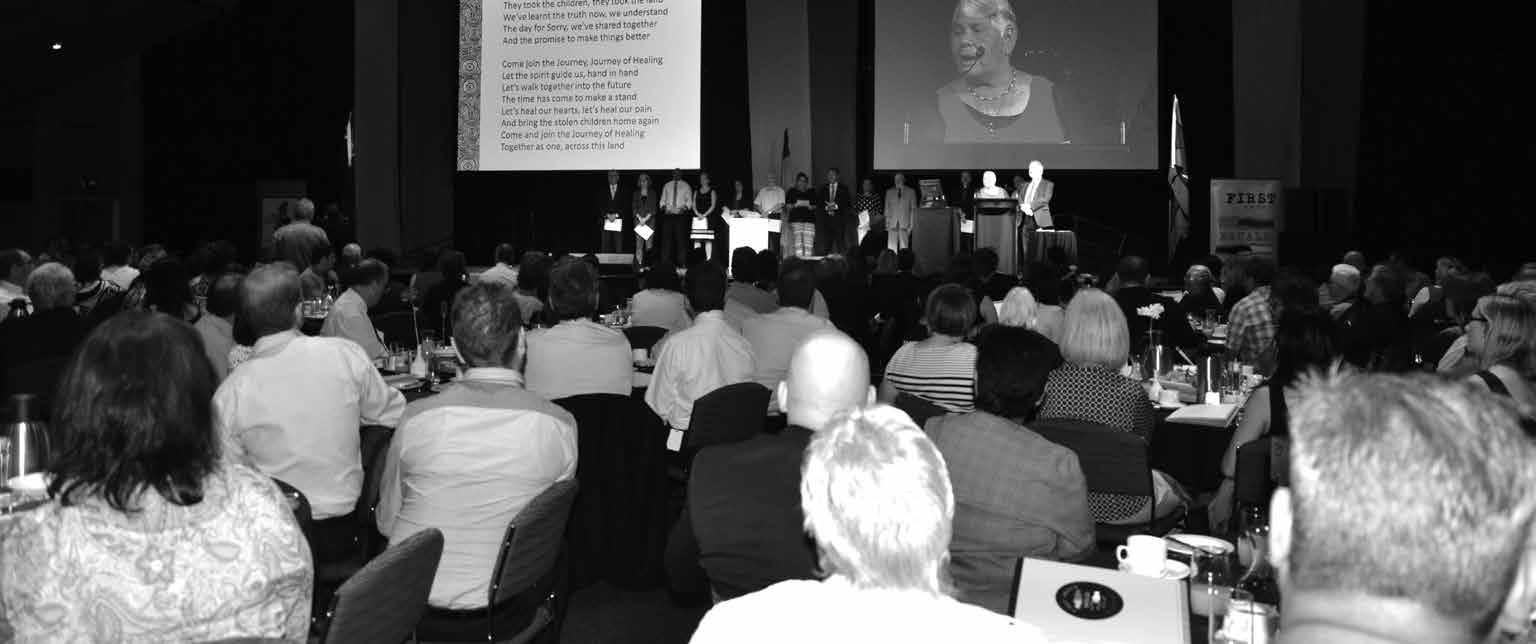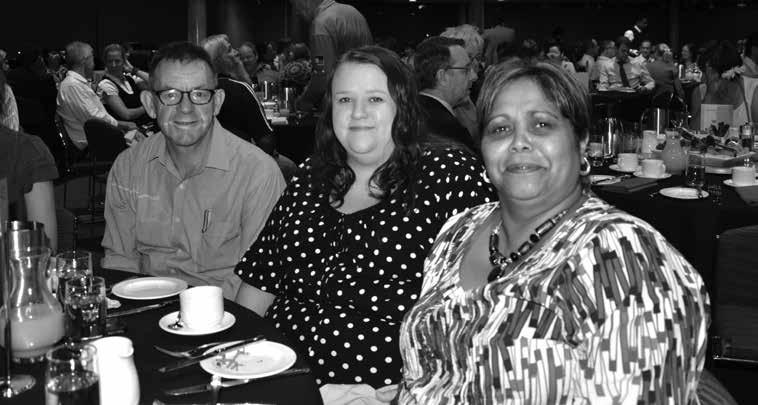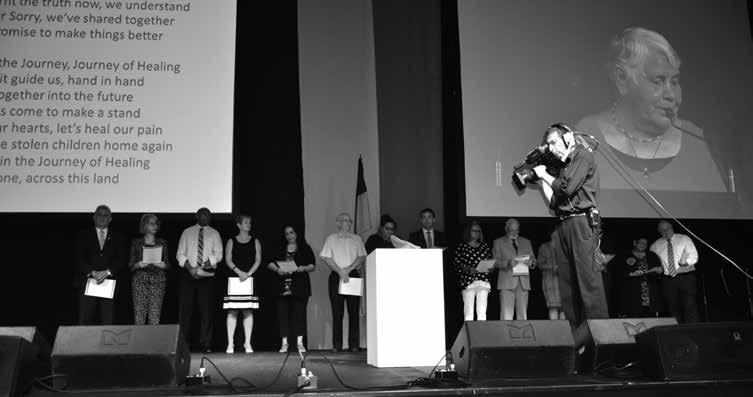
15 minute read
Native Title Act review
Caring for Country and Culture restores traditional owner custodianship of rock-holes park
Above: Allan Wallace. Right: Cameron Wheelock.
Advertisement
The rock-hole complexes throughout the Gawler Ranges are of cultural significance to the native title holders. The rock-holes and associated granite landscapes are also of ecological significance, comprising of isolated patches of mature vegetation with a high level of plant and habitat diversity and providing the only natural surface water resources across the region.
On Thurlga Station, the project Caring for Country and Culture is jointly applying cultural and western knowledge to restore and protect rock-holes through an integrated NRM approach. As a partnership between pastoralist Ian Morris, the South Australian Native Title Services and the Gawler Ranges Aboriginal Corporation, the project is delivering on-ground land management activities focussed on control of feral goats and weeds such as Horehound, seed collection and revegetation and the cleaning of rock-holes. Four members of the Aboriginal community have been engaged to undertake the on-ground activities, providing them with employment and training opportunities, as well as the experiences that come with working on country.
The project team has constructed two permanent water point trapping yards and in January the project team successfully trapped and trucked off the property over 1500 goats from the Tandaie rock-hole area. The yards are designed to operate in the height of summer when the rock-holes are dry, and after a prolonged dry period and in the absence of other available water-points, the infrastructure proved very successful.
The project team has also been reintroducing perennial groundcovers through direct seeding. These sites will be destocked for a number of years to assist in the regeneration of low lying Chenopod shrub land which has been historically overgrazed and degraded. With funding allocated through the Commonwealth Government’s Biodiversity Fund for the next two and a half years, the project will progressively restore the water harvesting capacity of rock-hole complexes by removing sediment, and reduce threats to associated landscapes and biodiversity. Caring for the rock-holes continues to be an important part of contemporary Aboriginal life, to maintain cultural values and connection to country. This project is a great illustration of cultural and pastoral interests working in partnership to achieve cultural, ecological and economic outcomes for all. ‘It has been a pleasure getting to know and working with the Working on Country lads Cameron, Cliff and Tristan, and has been a very rewarding process seeing them learn new skills and grow in confidence while spending time on country. Allan, who is also a traditional owner, has been a fulltime employee at Thurlga for the past three years. He has relished his role as supervisor, and has been an invaluable resource of knowledge and leadership’. Ian Morris, pastoralist Thurlga station.

Native Title Act review
The Australian Law Reform Commission (ALRC) is calling for community input into its review of the Native Title Act.
In August 2013, the ALRC was asked by the Attorney-General, the Hon Mark Dreyfus QC MP to inquire into Commonwealth native title laws and legal frameworks. Specifically, the ALRC Inquiry will be addressing two major issues: 1. Connection requirements relating to the recognition and scope of native title rights and interests; and 2. any barriers to access to justice posed by the authorisation and joinder provisions for claimants, potential claimants or respondents. The ALRC is releasing an Issues Paper in mid-March and will call for submissions, asking people to respond to questions in the Issues Paper and provide general feedback.
During the submission period in early May, the ALRC team will travel to Adelaide for face-to-face consultations. If you would like to contact us about consultations please see contact details below.
To find out more about the Native Title Inquiry and subscribe to inquiry updates, visit the ALRC website: alrc.gov.au/ inquiries/native-title-act-1993.
To contact the ALRC Native Title team, phone (02) 8238 6300 or email nativetitle@alrc.gov.au
Get kids to school: your children’s future starts today
The Remote School Attendance Strategy is aimed at increasing school attendance rates of Indigenous children in remote areas from the start of Term 1, 2014.
The Strategy targets an initial 40 communities in remote locations around Australia and aims to improve school attendance by engaging local people in each community to get children to school.
The Strategy is a partnership between the Australian Government, state and territory governments, schools, the Remote Jobs and Communities Program (and other employment providers) and remote Aboriginal communities. Through the Strategy, remote communities with poor school attendance rates will receive School Attendance Supervisors and Officers to help improve attendance rates, working with schools, parents and families to make sure that all children go to school each day.
A School Attendance Supervisor will be employed to guide and mentor School Attendance Officers working in their region. School Attendance Officers will be local Aboriginal people who are active members of the community. They may include mums, dads, carers, uncles, aunties or grandparents.

Information for communities
School – don’t miss a day
Families are telling the Government they want a good education and a better future for their kids. The Remote School Attendance Strategy is about working together – with schools, families, parents, and community organisations to ensure all children go to school every day.
Why do children need to go to school every day? It’s the law that all children in Australia go to school, each and every day. Going to school every day and getting a good education leads to a better future. Children should only miss school when they are sick. Parents need to let the school know when a child is too sick to attend, and need to check with the school that it’s okay for the child to be away for religious, ceremonial or cultural times.
What about children living in remote communities? It is just as important for children in remote communities to go to school every day as it is for those in the city. Many children in remote communities are not going to school every day, with attendance in some communities very low. We need to increase attendance rates in remote schools, so all children get a good education.
How will the Remote School Attendance Strategy work? The strategy will be implemented in partnership with communities and schools in locations in New South Wales, South Australia, Western Australia, Queensland and the Northern Territory, from Term 1 2014. The strategy is designed to be driven by the community, and adapted to the different needs of different communities. School Attendance Supervisors and School Attendance Officers will be engaged to help children get to school. A small fund will be available to assist the School Attendance Officers work with families for things like shoes and uniforms.
What will the School Attendance Supervisors and School Attendance Officers do? These are local people from the community and may be participants in the Remote Jobs and Communities Programme. They may be mums, dads, caregivers, aunties, uncles or grandparents who want to work to help kids in the community get to school. They will help parents and families to make sure their children have what they need to go to school each day.
They can help with things like: Talking with children and families about the importance of regular school attendance.
• Working with families where children are not attending school to find out why and what can be done to lift poor attendance rates.
• Walking children to school or making sure they get on the bus.
• Providing practical support like transport to school, assistance with school lunches, uniforms, homework or after school care.
• Working with the school to monitor attendance and follow up on student absences.
• Celebrate and reward improved attendance.
• All Supervisors and Attendance Officers will obtain working with children checks and participate in work-related learning activities.
What about the School Enrolment and Attendance Measure (SEAM)? The Remote School Attendance Strategy is designed to work alongside SEAM, by working with parents, schools and communities to encourage more kids to go to school each and every day. Where other strategies aren’t working and children are still not attending school, additional support through SEAM may be considered in some cases.
How will the Remote School Attendance Strategy work with other activities in the community? Getting kids to school is everybody’s business. Local councils, shops, sporting groups and other organisations will all need to get involved and help out.
Social Justice and Native Title Repor t T WENT Y YEARS ON
Last year marked the 20th Anniversary of the introduction of the Aboriginal and Torres Strait Islander Social Justice Commissioner, and with it, the annual Social Justice and Native Title Report.
Current Commissioner, Mick Gooda, used last year’s report to reflect on the progress of the past 20 years and deliver 14 recommendations to the Government regarding the future of Aboriginal and Torres Strait Islander rights and policy making.
Looking back on the Commission’s efforts since 1993, Mr Gooda reflects that there has been some progress in a number of areas including health equality, family violence, acknowledgement of the Stolen Generation and the campaign for the Constitutional Recognition of Aboriginal and Torres Strait Islander people as Australia’s First People. However, he also notes that in other areas there has been little to no progress. These areas include alcohol management, interactions with the criminal justice system, and the policy approaches of the Federal Government. The Commissioner takes lessons from past successes and failures and uses them to present his recommendations for a stronger future for Aboriginal Australia.
The report highlights the strengths of using the United Nations Declaration on the Rights of Indigenous People as the compass for Government policy making, and recommends the Government make use of this framework as a guide, particularly in the area of alcohol management. It also notes the importance of producing a National Strategy in line with The Declaration. This would involve a framework of self-determination and participation of Aboriginal and Torres Strait Islander peoples, and the respect for, and protection of culture, ensuring that equality and non-discrimination are remembered in all processes.
This strategy aims to increase Aboriginal communities’ control over their policies and projects and ensure that Governments play a supporting role, rather than dominating the process. Mr Gooda notes that the roadmap for our future should involve 3 consistent themes: Rights, Relationships and Responsibilities. This relates to the human rights of Aboriginal and Torres Strait Islander people being met, the relationship between Aboriginal and Torres Strait Islanders, and the Australian Government, and the responsibilities of both the Government, to deliver on its commitments, and Aboriginal and Torres Strait Islanders to take ownership of community issues. While providing constructive feedback on previous and current Indigenous policy, Mr Gooda is hopeful for the future, under the new Abbott Government: “If we manage to stay the course with the things that are working and make the fundamental shift to putting our communities in control now, I am very optimistic that all of our children will be given the opportunity to grow up to be happy and healthy adults, proudly carrying our culture forward for generations to come.” The Social Justice Commissioner’s 2013 recommendations to Government
1. Continue the multi-party approach in Aboriginal and Torres Strait
Islander affairs and base change to existing policies on rigorous evidence and consultation with communities.
2. Engage with the National
Implementation Strategy to give effect to the United Nations
Declaration of the Rights of
Indigenous Peoples.
3. Include the United Nations
Declaration on the Rights of
Indigenous Peoples in its definition of human rights.
4. Conduct a Referendum for
Constitutional Recognition within this Parliamentary term.
5. If the constitutional amendments for recognition proposed are different to those recommended in the Expert
Report, consult with Aboriginal and
Torres Strait Islander peoples before going to Referendum.
6. Continue to engage with the National Congress of Australia’s First Peoples.
7. Invite the National Congress of
Australia’s First Peoples to participate in relevant Council of Australian
Governments (COAG) processes.
8. Commit to the Closing the Gap agenda and the annual Closing the Gap Reporting to Parliament.
9. Negotiate a new National Partnership Agreement on Closing the Gap in Indigenous Health Outcomes, with a minimum investment of $777 million over the next three years.
10. Commit to supporting and implementing the National Aboriginal and Torres Strait Islander Health
Plan 2013-2023, and working in partnership with Aboriginal and
Torres Strait Islander people.
11. Finalise targets as part of the
Closing the Gap Strategy, focussing on increasing community safety, reducing imprisonment rates, and improving outcomes in child protection for Aboriginal and Torres
Strait Islander peoples.
12. Reintroduce and support the Native Title Amendment Bill 2012 (Cth).
13. Consider the following outstanding recommendations in the Native Title
Report 2009:
Amend the Native Title Act 1993 (Cth) to shift the burden of proof to the respondent when the applicant has met the requirements of the registration test.
That the Native Title Act 1993 (Cth) provide presumptions in favour of claimants, including presumptions of continuity in the acknowledgement and observance of traditional law and custom and of the society.
14. Continue to support the National
Anti-Racism Strategy.
Let ters Patent Anniversary marks time for action
Last month a gathering was held at Government House to celebrate the anniversary of the 1836 Letters Patent.
The Letters Patent were added to the provisions of the South Australia Foundation Act 1834 by King William IV. It gave recognition of Aboriginal people’s rights to the lands they occupied prior to European settlement. The Letters Patent 1836 included the words: “Provided always that nothing in those our Letters Patent contained shall affect or be construed to affect the rights of any Aboriginal Natives of the said Province to the actual occupation or enjoyment in their own Persons or in the Persons of their Descendants of any lands therein now actually occupied or enjoyed by such Natives.”
The occasion marked the 179th Letters Patent Day. On the day, Members of Parliament were invited by the United Aboriginal Movement for SA Change to listen to Aboriginal political leaders and supporters of the Letters Patent; and to openly discuss the State’s progress towards democratic representation of Aboriginal people in the parliament. Lynette Crocker, Kaurna Elder and Chief Executive Officer of the Aboriginal Political Party said it was King William IV’s order in the Letters Patent that land rights were recognised but the path of history has ignored his command. “Successive governments have not done what they were required to do. Instead they took and are still taking our land,” she said.
“We require South Australia to address the 1836 Letters Patent issues of constitutional change including: designated seats in parliament, indentured Treaty and Bill of Rights for South Australia; and their implications for International Indigenous political alliances and Aboriginal sovereignty. We will not rest until we have our voices heard in parliament, and we have our rights under the Letters Patent”, said Kaurna Elder Lynette Crocker.
Klynton Wanganeen, Narungga leader said “The Letters Patent is about our right to our land as First Nations people. It also gives us the opportunity to engage in the upcoming state election to get our people into Parliament.”
The Aboriginal Political Party is assisting Aboriginal parliamentary candidates. Members will act on behalf of the Aboriginal people of South Australia based on their rights and interests.
The Aboriginal Political Party is calling for proper representation in parliament by providing seats designated to Aboriginal members. On the anniversary at a gathering at Camp Coorong, Labor announced new legislation that sets out the guiding principles for consultation and cooperation between government and Aboriginal communities. At the gathering, Aboriginal Affairs and Reconciliation Minister Ian Hunter said it was important that government and Aboriginal communities were armed with the necessary expertise to take this journey together. “By supporting Aboriginal people to undertake governance and leadership training and programs, we will equip leaders with the knowledge and tools to enable them to create a lasting legacy of progress and success that their community can build upon,” Mr Hunter said.


Remembering the Stolen Generations: 6th anniversar y of the National Apology
Reconciliation SA held two events for the anniversary of the national apology. Firstly, a corporate breakfast at the Convention Centre, followed by a family BBQ at Botanic Park with a focus on health, social and emotional well-being.
Reconciliation SA was pleased to welcome Ken Wyatt AM, MP as the Keynote speaker at the annual anniversary breakfast. The Hon Ken Wyatt said the apology continues to resinate within parliament. “The apology gives hope to an aspirational future and acknowledges the pain and grief and what has been fought for in terms of the healing process amongst leaders. “I believe that the apology changed the minds of many who have a role in legislative context in every state and territory parliament because it caused them to reflect, it caused them to think about what it was, what it is and what it can be.
“And if we continue with this journey forward, than the next step is to have recognition in the Australian constitution,” said Hon. Ken Wyatt. Mark Waters, Reconciliation SA Manager said the day is about commemorating and celebrating the Apology, and remembering the Stolen Generations. “It is also about asking the question, what would recognition in the constitution mean to members of the Stolen Generation and does this take a step further towards healing and reconciliation, because mainly it is about this journey of healing that we are all on,” he said.
Minister for Indigenous Affairs, Nigel Scullion said the anniversary of the National Apology is a timely reminder of the historic day. “The apology was a moving experience for both Indigenous and non-Indigenous people and it is fitting that this important anniversary is acknowledged,” he said.
The Apology to Australia’s Indigenous Peoples was delivered by then Prime Minister Kevin Rudd on 13 February 2008, and acknowledged in particular the Stolen Generations.






From top, left to right: Breakfast participants; Paul Senior, Megan Walsh and Sherilee Kartinyeri; Mark Waters and Commissioner Khatija Thomas; Mark Waters and Lowitja O’Donaghue; Clockwise – Nicole Clark, Alex Vickery, Colin Darcy, Leahna Vandenheuvel, John Briggs, Paul Case and Emma Hamilton; Didge McHughes and Ivan Copley; Roma Aloisi and Shane Tongerie; Breakfast participants.


